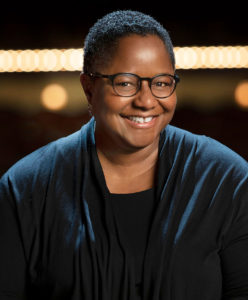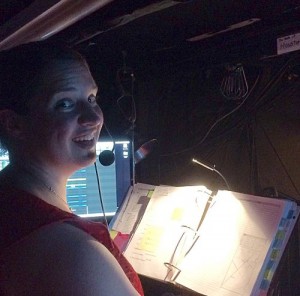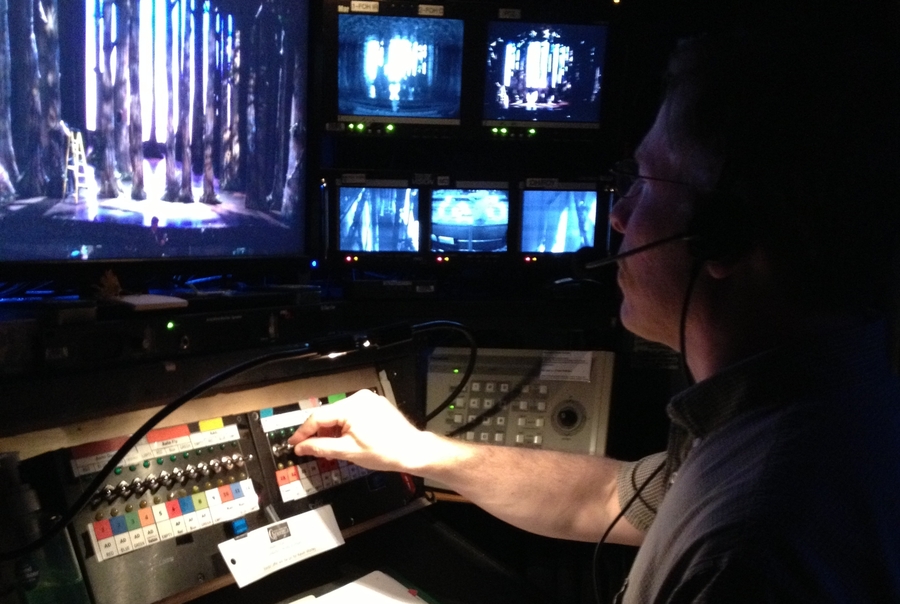“The misconception is that we’re technicians,” said Writers Theatre production stage manager David Castellanos (he/him), “and I am not one.”
This clarification was repeated in multiple recent interviews: that the job of a stage manager extends far beyond the expectations that they are simply timekeepers, paperwork clerks, or rehearsal room rule enforcers. That job description is far too narrow, as it leaves out an entire side of the stage manager’s role—a role that, especially now in the era of COVID and calls for racial justice and the declared year of the stage manager, has become increasingly important to acknowledge.
The so-called “hard skills”—paperwork, timekeeping, organization, and overall infrastructure—are no more important than the so-called “soft skills” called for by stage management, all of which are outlined by Lisa Porter (she/her) and Narda E. Alcorn (she/her) in the book Stage Management Theory as a Guide to Practice. These “soft” skills include conflict negotiation, communication tactics and strategies, listening, even cultivating empathy and compassion, and they are what separate a good from a great stage manager. As Alcorn explains, “We all know that these are among the most difficult skills to learn and continue to cultivate.”

Alcorn, chair of Yale School of Drama’s stage management training program, sees a good stage manager as someone who serves the production process well, providing for collaborators and promoting an environment where every single person is heard and is able to thrive and do their best work. That means having transparent and clear communication. Alcorn says she’s teaching the ethics of care, which places importance on the value of relationships—an important asset for a position uniquely situated to speak to and work closely with every member of the cast and production team. Still, there’s no question that when these soft and hard skills meet and need to be implemented in a rehearsal room, things can get messy quick.
As an example, Porter brought up the New York Times’ report from Michael Paulson on Berkshire Theater Group’s Godspell this past summer. As Paulson reported, stage manager Jason Weixelman was uncomfortable with some of the staging, given Actors’ Equity Association’s rules around performing live theatre during the pandemic. The tension caused by Weixelman’s uncertainty around whether Equity’s requirements meant that partitions were needed to separate performers at the front of the stage from those blocked at the back came through in the story.

“Then the stage manager of course is in that position of, ‘Do I go to the producer?” said Porter, head of stage management for University of California, San Diego. “‘Do I go to the union? How do I proceed?’ I am really curious to see how the union addresses this in terms of the safe and sanitary rules. Where is that line around what the stage manager is authorized to enforce? And who is accountable and liable? Where’s the scope of the stage manager’s authority? That’s been a question that is really different depending on the stage manager and the expectations of the producing organization.”
After all, a stage manager is generally regarded as in something of a position of authority, but they don’t have hiring or firing power. Often a stage manager may find themselves uniquely sandwiched between the hard skill requirement of knowing and enforcing the rules, and the inherent need to not step on toes or burn bridges.
“The stage manager’s role is complicated,” Alcorn explained, “because we are truly middle management in the most pure of ways. We do not make financial decisions nor hiring decisions—except for perhaps our team—and we’re charged with monitoring all of these many guidelines. If someone is upset with that, they can call the union—the same union, by the way, that is supposed to be representing us.”
That conflict has led to questions about stage management’s place within the actors’ union, and why this distinct sector of the field doesn’t either have its own union or fall under the jurisdiction of the International Alliance of Theatrical Stage Employees. As Equity vice president and Broadway stage manager Ira Mont (he/him) explained, it really has to do with the history of the position and its relation to the actors.
“We’re discussing how we could define ourselves so that both the outside world and our employers and colleagues could have a better grasp of who we are and what we do.”
The position of stage manager, he explained, evolved from a time when stage managers were also actors within the company. While those early stage managers helped to run the company, they were always primarily associated with the performing company. And, Mont pointed out, the reasoning for including stage managers and actors in the same union goes beyond the fact that it’s just the way it has always been.
“If you think of a show as starting from the first rehearsal and finishing on closing night,” said Mont (who also acknowledged that the development process on some productions can begin years before that first rehearsal), “there are really only two groups of people who are there and present from day one to day last: the actors and the stage managers. Crew isn’t there during rehearsals, directors leave after you open. People are in and out and part of different parts of the process. Actors and stage managers are there from the first day of rehearsal and closing night together.”
Mont, citing a simile used by an old colleague of his, likened the situation to that of loading-dock workers and a working foreman, where the person in charge of the dock is part of the same union—they just happen to be the foreman.

“The fact that we’re on the same playing field as them should make it a more collegial and easy methodology to keep everything in order,” Mont said. “I’m not the boss who can fire you or who can discipline you. So my conversation with you or my pointing something out to you or asking you to do something is not coming from a disciplinary perspective. Not only are we in the same union, we’re there together putting on the same show. We are symbiotically linked. I’m calling cues based on how you sing and how you move and how you say your lines. I like the notion that that connection is everlasting.”
This connection also highlights one aspect of what Mont said makes a good stage manager: doing what’s best for a show, which can mean very different things depending on the moment. Fundamentally it means taking care of the human beings working on a show. As an example, Mont pointed to the fact that some contracts only allow for a few personal days, or only allow unpaid leave for very specific reasons. However, sometimes it’s the job of the stage manager to step in between employer and employee and figure out a mental health day for a performer in need of one, even if the producer is unhappy about it. The job can also mean talking to a producer about greenlighting overtime when a show demands it.
“It’s a big job,” Mont said, “knowing that the show is a million different entities and having to keep track of what you need to push to the front, pull to the back, while always keeping safe. You don’t want to cost the producer money. You want to start the show at the beginning and end the show at the end.”
In pursuit of that task, stage managers must be adaptable, ready to shift and mold to the given needs of a production. That adaptability and ever-changing job description is the core of what it means to be a stage manager for Amanda Spooner (she/her), whose credits include the Broadway production of Indecent, Lincoln Center Theater’s production of The Wolves, and Soho Rep’s production of Anne Washburn’s very meta 10 out of 12.
“That’s part of the love of it,” Spooner said, “because it’s truly an adventure. If you are adaptable and you take the work seriously, but you don’t take yourself too seriously, you can be really great as a stage manager. At the same time, it also means you have to pay careful attention to your rights as a worker.”

While flexibility inherently makes a stage manager more hireable, it can also lead to complications, as stage managers try to balance setting personal boundaries with wanting what’s best for a given production. To give one example: Say a stage manager has learned over the years that they work best if their Mondays are email-free, but they’re on a production where other members of the production team expect a stage manager to respond to those Monday emails. In a field where issues like these aren’t fully spelled out in contract language, and in an open market of freelancers where a seemingly inflexible stage manager could easily be replaced, the challenge becomes how to remain competitive while protecting mental health and personal boundaries. For Spooner, this could mean needing to take her four-year-old to school and missing a meeting, or suggesting alternative meeting times.
“I’ve been lucky enough to be in spaces where I can be that transparent,” Spooner said. “But the truth is, when you say no to something and you walk away from that project at the conclusion of it, you don’t know what’s accumulated. And when I say accumulated, I mean, are your coworkers and your collaborators going to walk away from that experience being like, ‘She’s a great stage manager, but she has a kid and that’s annoying.’ You have that fear.”
So Spooner looks at what can be done at the individual, institutional, and field-wide level to alleviate this fear. A first step, she explained, is talking with her stage manager colleagues about her practices, her boundaries, and her paychecks. When she negotiates wages above the minimum or garners other concessions from producers, she shares these with her colleagues as well.
While it’s difficult to find and enumerate a full set of rules that define a stage manager’s job for all possible projects, Spooner said that having more conversations like this, about personal practice and experience, can uncover universal truths within the field, as well sharp contrasts. For instance, open conversations with colleagues led to the realization that the role of production assistant in New York is often filled by an Equity member, while Equity members in the West are not allowed to be in those positions. This is a topic Spooner said has garnered more attention since the pandemic lockdown started, as Zoom has brought different practices and approaches within the community to light. Indeed, one result of the lockdown is that it’s created a sense of connection among practitioners of a job that, Spooner said, can often feel isolated and vulnerable. Both Spooner, who serves as a stage manager counselor in the Eastern region for Equity, and Mont noted that the union is working toward more clarity for stage managers and their job descriptions.
“We’re discussing how we could define ourselves so that both the outside world and our employers and colleagues could have a better grasp of who we are and what we do,” Mont said, while simultaneously threading the needle of not confining them or laying too much on their shoulders by assigning the position a poorly constructed definition.
“What stage managers should be doing right now, as much as they can, is learning exactly how white supremacy culture functions in the performing arts.”
As Spooner noted, this process necessarily takes time. Thankfully, having specific language within contracts is not the only way forward for the stage management community. As Spooner put it, “There’s actually so much that can be achieved in a faster way through communication and collaboration with the greater community.”
Spooner alluded to the growing fight against 10 out of 12 technical rehearsals, admitting at the outset that she happens to love them, so much so that she eagerly signed on as stage manager of the premiere of Anne Washburn’s 10 out of 12. But the more she has thought about it, she said, she has come to realize that this love was trained into her; she was so in the trees that she couldn’t see the forest, and that, yes, things could be done differently.
“I call it the Miranda Priestly effect,” Spooner said, referring of course to Meryl Streep’s domineering boss in The Devil Wears Prada. “It’s like people are like, ‘Oh, well this is the way we’ve always done it, so we have to do it this way in order to impress the Miranda Priestly of theatre. We have to do it this way because a million other girls would kill to have your job.’ There’s such a feeling of scarcity that nobody zooms out and goes, ‘What did these expectations even mean? Why are they there? Why are we falling over ourselves to keep up with these expectations that have just run completely unchecked and become the working cultural norm?’ Everyone would be fools to go back to fully functioning venue-based theatre and not have changed any of this. I just have more faith in our community than that.”

Spooner added that, while contract language may be slow to address areas like the growing distaste for long hours, the decision to move away from them and change that working culture can be done without new language—as long as it’s not violating agreements, of course.
“When people start doing that, it’s very chicken and egg,” Spooner explained. “If we look to the community and that’s what they’re already doing, then back at the union ranch, we can be building contract language that reflects that. But we don’t have to wait for that contract language.”
As conversations around equitable practices and working conditions within stage management grow during the pandemic, so too do conversations around the place of stage managers in the current anti-racism movement in the industry.
“I think what stage managers should be doing right now, as much as they can, is learning exactly how white supremacy culture functions in the performing arts,” Spooner said. “What am I doing to dismantle white supremacy culture? You can’t dismantle it unless you know it, unless you see it. When stage managers go back, and their role is as a middle manager, you can pretend that because you’re not legally a supervisor, you can wash your hands of it. But you’re lying to yourself, because you’re clearly an authority in the room. You’re clearly functioning as someone who is guiding a project and guiding priorities and keeping clear goals.”
Spooner equated it to being a designated driver at Mardi Gras, surrounded by artists intoxicated by their art and in a vulnerable place, trusting the stage manager to get them home safely. With that kind of responsibility, it’s crucial to understand how best to create a safe space, address aggressions and microaggressions, and hear what people are saying while respecting their individual truths.
“We can be so useful to our directors and our creative and design team when they use us to our full potential.”
“I feel a significant responsibility to incorporate and integrate anti-racism into my process,” said Yale’s Alcorn, noting that anti-racism is part of her stage management students’ education. “I think we are uniquely situated to promote anti-racism in a rehearsal room and in a production process because we’re on the ground every day and we have meaningful contact with just about everybody in the process.”
The stage management position, she explained, is steeped in the same white supremacy culture as that of any manager or supervisor in the country. Throughout her career she’s seen too many stage managers who see their role as that of an enforcer, someone whose job is to make sure people don’t break the rules. As she teaches future generations of stage managers, focusing on empathy, communication, and listening, Alcorn acknowledges the importance of knowing how to have potentially uncomfortable conversations as the field moves through its current transition to an uncertain future. Her hope is that her white collaborators commit to these anti-racism practices, including a field-wide commitment to diversifying production staffs.
“I’m a Black stage manager who’s been talking about race since I could talk,” Alcorn continued. “Race has always been a part of my world, because of course it’s had to be. Many of my white collaborators, this is the first time that they’re naming race and seriously thinking about their place in a room. Whereas I’m someone who, I walk in a room and the first thing that I take notice of is, is there anybody like me? I think naming race is going to be really an important step, even though I think it makes a lot of people uncomfortable. It’s a really important step in helping to dismantle the oppression and realizing that it actually does matter if I’m the Black stage manager in a room full of all white designers. There is a dynamic there that is unmistakable, and we should acknowledge that.”
In all of the conversations I had for this article, the subject of being taken for granted came up, if not in so many words. The field often has an unconscious negligence about the creative role a stage manager plays in the production process. Talking only about hard vs. soft skills overlooks the part stage managers play in the artistic process, beyond the calling of cues on performance nights.

“I feel that there’s a misconception that I don’t understand the art, or I don’t know what makes a great play,” said Writers Theatre’s Castellanos. He noted that stage managers don’t simply observe the art being created, but internalize it. Whether educating understudies on discoveries a director and actor made about a character after weeks of trial and error, or weighing in with aesthetic opinions during conversations with the design team, a stage manager’s artistic input should not be undersold. After all, it is not until all aspects of stage management are taken into account that the true benefits to having a good one around can be seen.
“We can be so useful to our directors and our creative and design team when they use us to our full potential,” Alcorn said, “instead of just as clerks and timekeepers and enforcers.”
As the field moves forward into an uncertain future, and contemplates the changes needed for its workers to treat each other with actual equality and understanding, it’s important to acknowledge the many roles stage managers can play in shaping that future—yes, as organizers, but also as empathizers, supporters, and artistic collaborators. Rather than continue to undervalue their place in the rehearsal room and creative process, unique times like these, which require difficult conversations across the field, may provide a perfect opportunity to realize the full potential of this area of the field. After all, to truly move forward in the best way possible, it’s going to take everyone.
“I always assume that people want to collaborate,” Spooner said, “because that’s what brought them into theatre in the first place.”
Jerald Raymond Pierce (he/him) is associate editor at American Theatre. jpierce@tcg.org


